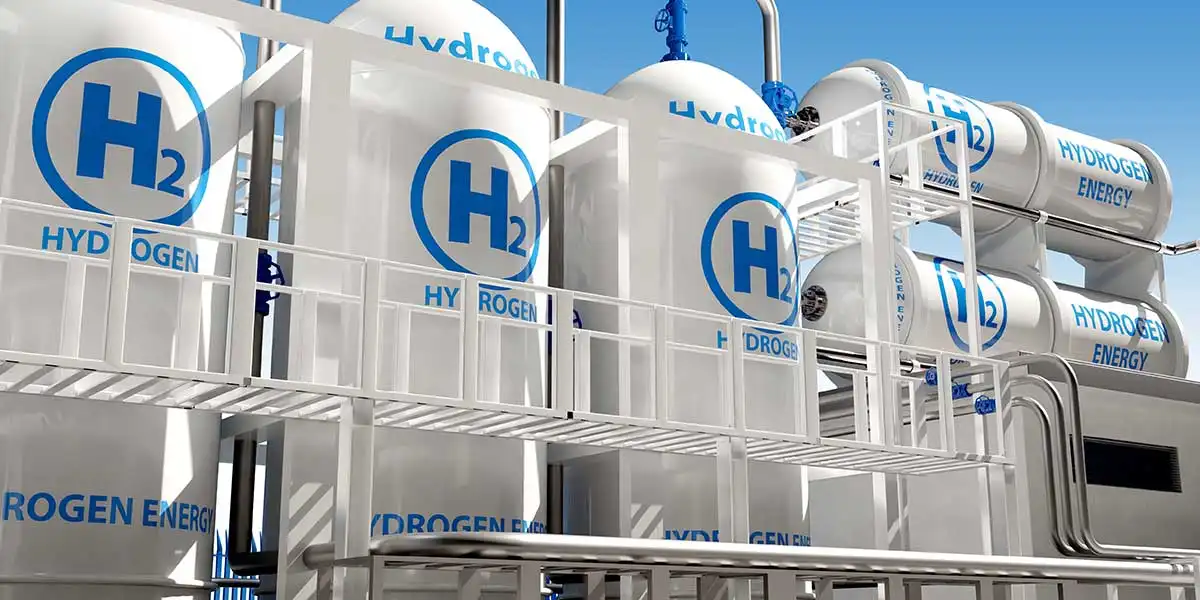With the global push for renewable energy, efficient energy storage solutions are essential for balancing supply and demand. While battery energy storage systems (BESS) have dominated the market, hydrogen energy storage (HES) is gaining attention as an alternative solution. But how does hydrogen storage work, and how does it compare to battery storage? Let’s dive into the details.
What is Hydrogen Energy Storage?
Hydrogen Energy Storage (HES) is a method of storing energy by converting electricity into hydrogen through electrolysis. The hydrogen can then be stored and later converted back into electricity using fuel cells or combusted for industrial applications. Unlike batteries, which store energy in electrochemical cells, HES stores energy in molecular form, hydrogen has the highest energy per unit mass of all fuels, making it suitable for long-term and large-scale applications.
The Development of Hydrogen Energy Storage
The concept of storing energy as hydrogen dates back to the early 19th century when electrolysis was first discovered. However, practical applications gained momentum in the late 20th century as hydrogen fuel cells were developed for space missions.
- 1960s-1970s:NASA used hydrogen fuel cells in space exploration (Apollo missions).
- 1990s:Hydrogen fuel cell vehicles were introduced.
- 2000s-Present:Hydrogen is being explored for grid energy storage, industrial decarbonization, and transportation.
With advancements in green hydrogen production (using renewable energy for electrolysis), hydrogen storage is now seen as a key player in the transition to a carbon-neutral future.
Why Can Hydrogen Store Energy?
Hydrogen acts as an energy carrier, meaning it does not generate energy itself but can store and release energy efficiently.
- Electrolysis Process:Electricity is used to split water (H₂O) into hydrogen (H₂) and oxygen (O₂).
- Storage:Hydrogen can be stored in compressed gas tanks, liquid hydrogen tanks, or solid-state storage (metal hydrides).
- Energy Release:Hydrogen can be burned in combustion engines, used in fuel cells, or converted back to electricity when needed.
Since hydrogen can be stored indefinitely, it is a promising solution for long-term and seasonal energy storage, unlike batteries that degrade over time.
Key Components of a Hydrogen Energy Storage System
A Hydrogen Energy Storage System consists of the following main components:
| Component | Function |
| Electrolyzer | Splits water into hydrogen and oxygen using electricity. |
| Storage Tanks | Stores hydrogen in compressed gas, liquid form, or solid-state materials. |
| Fuel Cell/Combustion System | Converts stored hydrogen back into electricity or heat. |
| Compressor | Pressurizes hydrogen for efficient storage and transport. |
| Renewable Energy Source | (Optional) Solar, wind, or hydro energy used for green hydrogen production. |
Depending on the application, hydrogen storage can be used for grid balancing, industrial power supply, transportation, and heating.
Advantages and Disadvantages of Hydrogen Energy Storage
Advantages:
- Long-term storage capability:Unlike batteries, hydrogen does not lose energy over time.
- Scalability:Suitable for large-scale energy storage, including national grids.
- Renewable hydrogen potential:Can be produced using solar and wind power.
- Multi-use applications:Can be used for electricity generation, heating, and fuel for transportation.
Disadvantages:
- Low efficiency:The round-trip efficiency (energy conversion losses) is only 30-50%, compared to 80-90% for batteries.
- Infrastructure challenges:Hydrogen storage requires specialized tanks, pipelines, and fuel cells.
- High production cost:Electrolysis and hydrogen fuel cells are still expensive compared to battery systems.
- Safety concerns:Hydrogen is highly flammable, requiring strict handling procedures.
Hydrogen Energy Storage vs. Battery Storage: Which is Better?
| Feature | Hydrogen Energy Storage | Battery Storage (BESS) |
| Energy Density | High, but requires large storage volume. | Lower, but more compact. |
| Efficiency | ~30-50% (low conversion efficiency). | ~80-90% (high efficiency). |
| Storage Duration | Long-term (weeks to months). | Short to medium-term (hours to days). |
| Infrastructure | Requires electrolyzers, storage tanks, and fuel cells. | Requires only batteries and inverters. |
| Cost | High due to electrolysis and fuel cells. | Lower and improving with economies of scale. |
| Application | Large-scale, seasonal energy storage, industry, and transport. | Short-term grid balancing, home, and commercial use. |
For grid-scale seasonal storage, hydrogen is more suitable. However, for daily energy storage and small-scale applications, batteries are currently more efficient and cost-effective.
Challenges in Hydrogen Energy Storage
Despite its potential, hydrogen storage faces several challenges:
- Low Efficiency– Energy is lost during electrolysis, compression, and fuel cell conversion.
- Cost of Electrolyzers and Fuel Cells– These technologies are still expensive and need further development.
- Storage Complexity– Hydrogen must be stored at high pressures (350-700 bar) or extremely low temperatures (-253°C for liquid hydrogen).
- Infrastructure Investment– Unlike batteries, hydrogen requires dedicated pipelines, fueling stations, and safety measures.
- Public Safety Concerns– Due to hydrogen’s flammability, handling and transportation require advanced safety protocols.
Future advancements in hydrogen fuel cell efficiency, electrolyzer cost reduction, and storage technologies will determine how competitive hydrogen energy storage can be compared to battery storage.
Examples of hydrogen energy storage projects currently under construction
On September 25, 2024, the construction of the Grove Mulei, China 200MW/1600MW.h hydrogen energy storage peaking power station started. This is currently the largest hydrogen energy storage project in the world. After the project is completed and put into operation, it can produce 40,000 tons of hydrogen, 320,000 tons of industrial oxygen, and 51.6 million tons of high-temperature hot water each year.
Further reading: What is a Megawatt (MW) and how many homes can it power?
Conclusion
Can hydrogen store energy? Yes, and it is a promising solution for long-term and large-scale energy storage. However, due to efficiency losses, high infrastructure costs, and current technological barriers, battery storage remains the preferred choice for most short-term and residential applications.
Looking ahead, the future of energy storage will likely involve a hybrid approach, where hydrogen storage is used for long-term energy needs, while batteries handle short-term fluctuations. With continuous innovation and investment, hydrogen energy storage could play a vital role in achieving a sustainable and renewable energy future.
Save Money, Protect Environment
PKNERGY helps you reduce your energy bills for your home solar energy storage, store your solar energy for use anytime- at night or during an outage.





